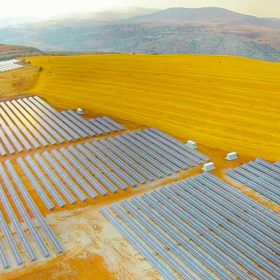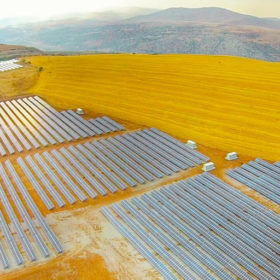Financing solar in Turkey – Green finance and new business models

Looking at the various solar power plant mechanisms brought by regulatory changes in 2020, the Turkish PV market is aiming to adopt some exciting new financial and business models.
YEKDEM (Yenilenebilir Enerji Kaynakları Destekleme Mekanizması) – a FIT scheme introduced by the Turkish Government – will come to a close at the end of 2020. The details of what will follow have not yet been announced. The scheme is accepted as an additional guarantee by domestic financial institutions and facilitates the financing of solar projects. As it stands, after this year loan repayments will be under the sole guarantee of the borrower.
The FIT payments were initially made in U.S. Dollars (USD), which was good in terms of currency risk, since the majority of CAPEX costs are also in USD (panels and inverters etc.).
Unlicensed solar rooftop and facade projects operate on a self-consumption basis. In the case of self-consumption, savings are made on the Turkish Lira (TL), and investors will make repayments to a bank instead of a distribution company.
For mini- Renewable Energy Resource Areas (RERAs), there are tenders to determine electricity prices. On March 26, 2020, the 4th Article of the Utilization of Renewable Energy Resources for the Purpose of Generating Electrical Energy Law (Law No: 5346) was amended so that all further RERA tenders would be held in Turkish Lira (TL).
Despite the changes, Turkey has a strong banking sector and there is no doubt that financial institutions will adapt quickly after these new developments and keep on financing solar projects.
On the other hand, high inflation, currency volatility, maturity mismatch between loans and deposits, increasing non-performing loan (NPL) rates and maturity restrictions, especially for retail loans, are the main barriers for the financial sector. Due to the transition from a FIT to net metering, financial institutions may ask for additional collateral as returns on investment are generated from savings. Whereas under the FIT, electricity is sold to the grid as a tariff and cash is generated by the solar project for loan repayment. These payments can be assigned to the financial institutions directly, and therefore it can be considered as a collateral.
Green solar finance and new business models for PV investments in Turkey
The most common forms of green finance in Turkey have been green credit lines and loans issued by the Development Finance Institutions (DFIs). Two major players are the European Bank for Reconstruction and Development (EBRD) and the World Bank. The French Development Agency, AFD, the German Development Bank, KfW, and the European Investment Bank (EIB) are also active players. Some projects are financed or co-financed by the Asian Development Bank (ADB), the Islamic Development Bank (IsDB) and the Japan Bank for International Cooperation (JBIC).
Green finance
Throughout Q2 2020, pv magazine has been diving deep into the topic of green finance and what it means for solar industry players, as a part of its UP sustainability initiative. Topics include the European Green Deal, regional growth opportunities, green bonds, and the role of the carbon bubble. Stay tuned and get involved!
EBRD has been financing solar projects through three financing facilities – TurSEFF, MidSEFF and TuREEFF – using blended finance approaches to generate bankable project pipelines and portfolios, by providing technical support and facilitating access to funding. The green fund contributors, along with EBRD are the Clean Technology Fund (CTF), EIB and JBIC. The donors for technical assistance are the European Union and CTF. Loans are provided to final beneficiaries in cooperation with local private banks/leasing companies in Turkey. These three financing facilities differ from each other according to their target clients and size of projects. Until now, all the financing facilities have been managed and implemented by Stantec in Turkey.
The Turkey Sustainable Energy Financing Facility (TurSEFF) predominantly covers the unlicensed category for ground mounted and rooftop solar power plant investments up to 10 MW. Since 2010, 526 MW worth of renewable energy projects, comprising 357 MWs of solar, have been financed by TurSEFF.
Particularly at the beginning of Turkey’s solar market, TurSEFF played a pioneering role in creating a leverage effect. By the end of 2014, TurSEFF had financed 70% of the installed SPP capacity (27 MW of 40 MW), and by the end of 2015, it had financed 61% (152 MW of 249 MW). This was due to the new “unlicensed” generation mechanism and regulation introduced in October 2013 and confirmed how the decisions and actions of the governmental authorities profoundly shape the electricity market. Since 2010, €645 million worth sustainability projects have been financed; and TurSEFF phase III (started in 2017) has a €400 million fund.
TurSEFF further aims to promote new business models in the Turkish solar market, such as energy performance contracts, energy service companies (ESCO), prosumers (under the self-consumption model), and power purchase agreements (PPAs). In February 2020, TurSEFF and Solarbaba, a solar social enterprise, organized a PPA workshop with the participation of major stakeholders, in order to exchange ideas on the adaptation and promotion of the Renewable Corporate Power Purchase Agreement (PPA) as a finance model in the Turkish renewable energy sector. The main purpose was to enable the use of PPAs to increase renewable energy capacity – particularly solar – in Turkey.
Turkey’s Mid-size Sustainable Energy Financing Facility (MidSEFF) covers renewable energy power plant investments requiring a loan of up to €50 million. Since 2011, 1,396 MW of renewable energy projects have been financed by MidSEFF, equating to €1,054 million worth of financing. Twenty three projects with a total installed capacity of 356 MW comprised solar: 105 MW licensed and the rest unlicensed. Meanwhile, by March 2020, 58.4% of licensed solar totaling 179.8 MW was financed by MidSEFF.
The Turkish Residential Energy Efficiency Financing Facility (TuREEFF) awards residential consumers for rooftop solar power plant investments on buildings. However, small-scale rooftop solar for residential consumers haven’t become practical enough yet in Turkish solar market.
For solar and renewable energy projects larger than 50 MW, the EBRD prefers to finance directly, although it may sometimes enter with private equity for the renewable energy portfolios of Turkish companies. As an example, in 2018, EBRD backed Akfen Holding’s renewables portfolio in Turkey with $102 million, $52 million of which was for nine solar projects totaling 85 MW. The EBRD and the IFC – the private sector arm of the World Bank – are minority shareholders in the company, each with a 15.98% stake. Akfen’s green loan is Turkey’s first ‘green project finance’ loan after the first green corporate loan agreement signed in Q1 2018.
The World Bank does not have a solar financing facility of its own in Turkey; however it is a major player via direct finance (loans) or private equity, as in the Akfen example above.
Moreover, the World Bank has been providing concessional loans from time to time in cooperation with two Turkish development banks – the Development Investment Bank of Turkey (TKYB) and the Industrial Development Bank of Turkey (TSKB) – or state owned banks, such as Iller Bank, Vakifbank, Halkbank and Ziraat Bank. One recent example is a $500 million World Bank fund to be provided specifically to the municipal sector’s renewable energy and energy efficiency investments under the “Sustainable Cities” project, in cooperation with Iller Bank of Turkey – a development and investment bank serving municipalities.
Local private financial institutions, including commercial banks, leasing companies and participation banks, have also developed their own green finance products to reach end clients. Examples include: “İş’te Güneş (Here is the Sun)” by Isbank; “Solar Loan” by Garanti BBVA; “Energy Leasing” by Aklease; “Güneşli Günler Sizi Bekliyor (Sunny Days Are Waiting For You) by DenizLeasing; and the “Unlicensed Renewable Energy Package” by Turkey Finance Participation Bank.
Both banks and leasing companies actively finance PV investments. However, since leasing companies are naturally owners of equipment during the repayment period, they may ask for less collateral compared to commercial banks. In addition, leasing credit limit does not reduce the working capital loan limit of borrowers, which is extremely important under the current circumstances. It seems that leasing sector will be more active compared to banks in financing rooftop solar PV.
Regarding raising money from investors, the Industrial Development Bank of Turkey (TSKB) issued Turkey’s first green/sustainable bond in May 2016, totaling $300 million and with a five-year tenor. The bond issue attracted demand 13 times the size of the issue, totaling $4 billion from 317 institutional investors in the international markets.The green bond was used for private sector investments for climate (renewable energy and resource efficiency) projects and socially responsible (i.e. healthcare, education) projects.
In August 2019, Isbank issued the first 100% green bond worth $50 million and with a 10-year tenor to be used in renewable energy, energy efficiency, resource efficiency, clean transportation, green buildings, etc. Two other banks – Garanti BBVA in December 2019 and Yapi Kredi in January 2020 – each issued five-year, $50 million green bonds.
As a new business model in the Turkish market, Foton Energy launched Turkey’s first renewable energy certificates platform in April 2020. It was developed in collaboration with the Energy Web Foundation (EWF) and in accordance with I-REC standards, in order to ease and scale the supply of renewable energy supply. This platform aims to become an open marketplace for renewable energy certificates.
In conclusion, the dynamic nature of the Turkish solar market should remain vivid in 2020 and beyond. This compels market players and shareholders to maintain continuous self-improvement and flexibility to adapt. The financial sector’s interest in PV finance has been increasing, because default rate of efficiency loans are lower and it is part of their lending objectives for sustainable development. Available IFI funds specific to PV finance with reasonable conditions will be the trigger for the realization of potential investments.
About the authors
Selen Inal, Koray Goytan, Alican Ozden and Ozlem Yakut, are experts working for Stantec Turkey, a strategic consulting firm which operates in environment, water, infrastructure and energy sectors.


